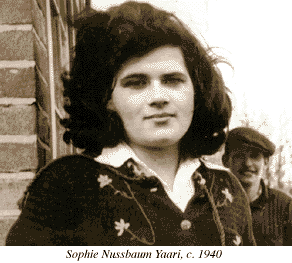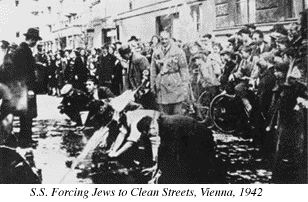Sophie Yaari Tells Her Story (continued)
 Kristallnacht:Then Hitler ordered the pogrom on the 9th of November, 1938--
Kristallnacht.
I was thirteen years old. We were all in bed sound asleep when we were suddenly woken by a loud knocking on the door--it was one or two o'clock in the morning.
Kristallnacht:Then Hitler ordered the pogrom on the 9th of November, 1938--
Kristallnacht.
I was thirteen years old. We were all in bed sound asleep when we were suddenly woken by a loud knocking on the door--it was one or two o'clock in the morning.
"Open up! We're taking all of you to Palestine," they shouted.
We never believed that, of course. They broke our windowpanes, and the house became very cold. Quickly, my mother tried to gather up some valuables--some gold things--but one of the men hit her on the arm with his gun, making her drop them. They made us leave everything behind when they took us away--to a Christian school. We were standing there, outside in the cold, still in our night clothes, with only a coat thrown over. They kept bringing more and more Jewish people from all over the neighborhood. Babies were crying.
The horse butcher and his family were there. He was Jewish, but his wife was not, and they had not raised their children as Jews. I can still hear the daughter crying, "But Mommy, we are not Jewish!"
"You are not here because of your religion, but because of your blood!" said the S.S.
Then they made everyone lie face down on the ground. It was quite cold.
"Now, they will shoot us," we thought. We were very afraid.
Then abruptly, "Get up!"
They kept us there until the sky was light, and then they took us into the gymnasium, and called out everyone's name. They had lists--wonderfully organized. After that, we were allowed to go home. But they kept the men.
When we got home, we found an S.S. man with a gun walking up and down our street. Everything was smashed up, but we were not allowed to go into our shop--it was forbidden. He said that it wasn't ours any longer, that we owned nothing, we were nothing, our lives were nothing. When the S.S. got to the furthest corner, I ran inside and took out what I could.
My mother was afraid they might come back to our house that night, so she sent my younger sister Ruth and me to sleep at our Aunt Lena's house--somehow they had forgotten about Aunt Lena. My mother and grandmother, who was living with us, went upstairs to the flat above ours, to stay with Mrs. Ludenstein. About 4 o'clock in the morning they heard heavy footsteps, then nothing--everything was quiet. My mother was afraid to go down, but my grandmother said, "I'll go." She found my father sitting there, making himself a cup of coffee.
The S.S. had sent Father home because he had influential Christian friends who had interceded on his behalf. The other men were not so lucky. When Ruth and I came back the next morning, we overheard the street cleaners saying, "Oh, during the night they brought all the Jewish men to the train station, and took them away." They sent them to Sachsenhausen and Oranienburg concentration camps.
But my father was free, and we were so happy. We cleaned up the mess, and they let us open the shop. On the 15th of November the S.S. came to our house again.
"Mr. Nussbaum, come with us to visit Mrs. Ludenstein." they said. "Her husband has died."
My father had to go with the Gestapo to tell Mrs. Ludenstein that her husband was the first to die in the concentration camp. Everyone in the Jewish community was afraid when they heard about it. So soon. He had only been there two days.
 After a few weeks, they let the men out of the concentration camp, but now they had to work for the Gestapo, cleaning the streets. We saw lawyers and scholars out in the cold, with no hats, repairing the roads--it was a terrible sight. My mother told me it was not important what your work was as long as it did not harm another person. I was getting an education: I saw my uncles working very hard all day long, and still not earn enough money to feed their families. My father helped them a lot. We still had our shop, but now we were allowed to sell to Jewish people only between five and six o'clock in the evening.
After a few weeks, they let the men out of the concentration camp, but now they had to work for the Gestapo, cleaning the streets. We saw lawyers and scholars out in the cold, with no hats, repairing the roads--it was a terrible sight. My mother told me it was not important what your work was as long as it did not harm another person. I was getting an education: I saw my uncles working very hard all day long, and still not earn enough money to feed their families. My father helped them a lot. We still had our shop, but now we were allowed to sell to Jewish people only between five and six o'clock in the evening.
Then on a certain date we had to close the shop. My parents had to leave our house and move all six of us--grandmother too--into one room in the house of three Jewish old maids who lived on another street.
After Kristallnacht, the Dutch government began giving visas to German and Austrian children who had relatives in Holland. Ruth and I had an aunt there who applied for us. When our visas arrived a few months later, we immediately packed up, and went with our mother by train to the border. My father stayed at home because only one parent was allowed to accompany the children.
I'll never forget how she said goodby, crying. Everything was terrible. My mother told me I was responsible for my sister, who was ten years old. She walked with us to the border; we said goodby and walked across--it was only a few meters. It was January 25, 1939. I never saw my parents again.
On the other side there was a Nazi woman in uniform.
"Take off all your clothes!" she ordered.
We took off our clothes. She looked us over to see if we were hiding money, because Jewish people were not allowed to bring out more than ten marks--about ten dollars. They put us on a train to Rotterdam. When we arrived, we were met by ladies from a Jewish committee, who took us that same evening to a place that in normal times was a summer camp for poor Dutch Jewish children. They had opened it up that winter for the German refugees.
Ruth and I stayed in this home with about forty other refugee children until April. I'm sorry to say that the Jewish woman in charge of the place was not good for us. She didn't understand what we needed, and made us feel very bad. We were not allowed to write home whenever we wanted, only once a week. We could phone just once a month, and then we would do nothing but cry on the phone. I was at the age of puberty and had no one to speak to about it. It was a hard time. Then we learned about the Zionist Youth homes that were opening for children our age, and I asked to go.
 After a few weeks, they let the men out of the concentration camp, but now they had to work for the Gestapo, cleaning the streets. We saw lawyers and scholars out in the cold, with no hats, repairing the roads--it was a terrible sight. My mother told me it was not important what your work was as long as it did not harm another person. I was getting an education: I saw my uncles working very hard all day long, and still not earn enough money to feed their families. My father helped them a lot. We still had our shop, but now we were allowed to sell to Jewish people only between five and six o'clock in the evening.
After a few weeks, they let the men out of the concentration camp, but now they had to work for the Gestapo, cleaning the streets. We saw lawyers and scholars out in the cold, with no hats, repairing the roads--it was a terrible sight. My mother told me it was not important what your work was as long as it did not harm another person. I was getting an education: I saw my uncles working very hard all day long, and still not earn enough money to feed their families. My father helped them a lot. We still had our shop, but now we were allowed to sell to Jewish people only between five and six o'clock in the evening.
 Kristallnacht:Then Hitler ordered the pogrom on the 9th of November, 1938--
Kristallnacht.
I was thirteen years old. We were all in bed sound asleep when we were suddenly woken by a loud knocking on the door--it was one or two o'clock in the morning.
Kristallnacht:Then Hitler ordered the pogrom on the 9th of November, 1938--
Kristallnacht.
I was thirteen years old. We were all in bed sound asleep when we were suddenly woken by a loud knocking on the door--it was one or two o'clock in the morning.